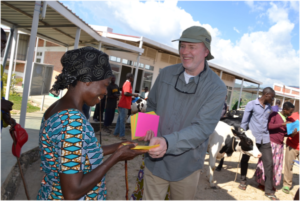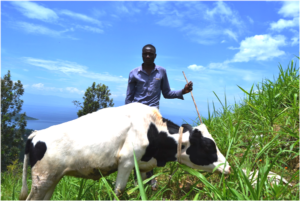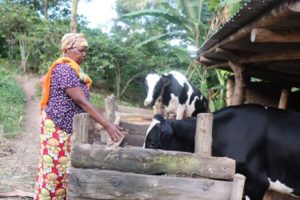
Residents of Boneza in western Rwanda were gifted with 52 cows from the Covenant Life Church in Grand Haven in Michigan, USA, during a ceremony at Kivu Hills Academy.
By Steven Nsamaza;
The King was sick and bedridden, indeed. King Gihanga (1091 – 1124) had just arrived in Nyamirembe, in Gatsibo-Byumba (north-east Rwanda) after a sharp disagreement with his young cousin, Gahu who had impregnated his daughter Nyirarucyaba.
Nyirarucyaba, a princess brought milk which the hailing father fed on. After a few days his health improved.
On learning that his life had been saved by milk from Gahu, King Gihanga forgave him. Gahu also gave the King many cows as act of penitence. The King changed Gahu’s name to Kazigama, meaning “One who gives cows.” Reconciliation was henceforth rooted to milk and donation of cows in the Rwandan traditional society.
Since that time, the Rwandan society attaches a lot of value to cows. Apart from the medicinal importance, cows became a symbol of wealth, love and unity. This is very explicit when one considers it in the cultural context of ancient Rwanda where only Kings,heroes and cows had poets who piled praise poems for them.
During the post-genocide era in Rwanda, the country ravaged with poverty-ridden, malnourished and a population polarized along ethnicity lines. The government came up with solutions that are a replica of the traditional solutions. From within the Rwanda cultural granaries, a solution was born dubbed Girinka or ‘one cow per poor family program’.
Arise Rwanda Ministries (ARM), a nonprofit organization with a mission to fight poverty, building sustainability and prosperity with focus on holistically individual communities tapped into the national program.
John Gasangwa, founder and President of Arise Rwanda Ministries notes that the organization was founded to give hope to the people of Boneza, a community of 26,000 people in Rutsiro District, Western Province of Rwanda.
To uplift the residents of Boneza from poverty, ARM started ‘Have A Cow Campaign’ as one of its first initiatives launched to salvage the poor in Boneza and started with victims of the Genocide against the Tutsi. The campaign with a target of granting at least 10 cows annually, this year received a major boost from the Covenant Life Church in USA.
“When one family receives a cow, the impact spreads throughout the community,” explains Gasangwa. When a family is gifted with a cow which must be female, they are food secure because of the nutritious milk and manure to apply as fertilizers for the crops. When the first female calf is born it is gifted to a neighbor and this strengthens social relations of the community as the gifting of a cow continues to make rounds.

Covenant Life Church donates 52 cows
The Covenant Life Church in Grand Haven in Michigan, USA, donated 52 cows to Boneza community in western Rwanda. The cows were officially distributed to the families on February 17, 2020 at Kivu Hills Academy in Boneza, which is also part of ARM initiative.

The Covenant Life Church, a vibrant, multigenerational congregation in downtown Grand Haven close to the shores of Lake Michigan answered the call to the transformational program gifting cows to impoverished families in rural Rwanda.
“Sunday school children at the church kicked off the campaign to donate cows when they heard that many of their fellow children in Boneza were not as privileged even for a cup of milk,” explained Dave Knibbe, a member of the Global Mission Committee at Covenant Life Church.
Knibbe, also a board member of ARM traveled half way around the world to Boneza Sector in Western Rwanda to handle out the great gifts to the beneficiary families.
At the ceremony to give the cows, Knibbe personally handed out colorful envelopes from their benefactors with their photo, letter of support and proposed name for the cow.
He told the beneficiaries that the cows were donated from Covenant Life Church community who wished well the people of Boneza. He underlined that the donation was intended to help improve lives and relationships.
The cows were not shipped directly from America but sourced locally and some of the beneficiaries had a hand to what they were to get.
Martini Bibutsuhoze, 29, received a cow for the first and had picked it himself which had been a satisfying experience to him.
The father of one, a six-month baby was thrilled that when his baby starts weaning, he will have the nutritious milk to substitute.

Bibutsuhoze is not looking at the milk for his baby alone, as a smallholder farmer he is expecting to raise productivity because of manure from the cow.
“My land needs fertilizers to increase productivity and I could not afford to buy fertilizers, with this cow I am sure will be the happiest man by end this season,” Bibutsuhoze says with a smile.
Bibutsuhoze has big plans of once owning a shop and has started retailing food stuffs like ground nuts,in one year he hopes his cow will be milking enough for his home and sell the rest of the milk which will most likely increase his capital.
Bibutsuhoze’s dreams are not farfetched as one cow per poor family initiative has worked wonders in transforming the lives of poor farmers by enabling them to increase agricultural production, food stock, nutrition, income of the beneficiaries and reconciliation.

Tasiyani Mukankubito, 61, is genocide survivor who received a cow from ARM in 2016. The cow she received has already produced three times, she gave away the first calf, sold another and still has two beautiful cows in her kraal.
Mukankubito says she was blessed to get a cow from Gasangwa (meaning the founder of ARM). “He found me desolate, poor and hopeless. When he gave me a cow, I felt lucky and started to get hope because some people cared about me, so I got a purpose to care for the cow. ”
During the 1994 genocide against the Tutsi, Mukankubito lost 70 members of her family and was always crushed by grief. When she received the cow, one of the persons among those who killed her family came to ask for forgiveness from her, as some kind of penitence he started helping her with chores in the kraal.
Mukankubito in return would give him milk, she says they have reconciled. Even though this man helped kill my family but I genuinely forgave him, she notes, because he sought forgiveness and I also wanted to unburden my soul.
Powerful stories of reconciliation attached to one cow per poor family program have been heard around Rwanda.
But how does the program deliver!
Grace Nirere, the coordinator of the program at Arise Rwanda Ministries in Boneza explains that proper procedures are followed in identifying the right beneficiaries and this is done at the local government level. “The reason for this is that we don’t want to just give cows to anyone poor but only those with capacity to feed the cow,” she said.
Farmers’ enthusiasm is also one driving force for the success of the project.

Grace says that from the cow farmers are able to get manure, milk for the family and can sell the rest. From the proceeds they are able to buy other food stuffs, making them food sufficient.
To promote reconciliation, when a genocide survivor is given a cow and it gives birth to a female calf, the program facilitators encourage that the calf is passed on to neighbor or the family that participated in genocide and have sought forgiveness. In the case of a male calf which may delay passing on the cow, they encourage to share milk among families so that your neighbors also have milk for the young ones to avoid malnutrition and improve relationships.The rest of the offspring remain with the donor family.

Since ARM started operations in Boneza nine years ago has donated over 200 cows, the Executive Secretary of Boneza Sector, Jules Niyodusenga observes that to have ARM in his sector is a blessing because the organization has been very significant in uplifting the welfare of residents.
Niyodusenga revealed that 988 cows have so far been donated in Boneza and with 5,700 households, he wishes for more initiatives like ARM to support this mainly agrarian community in their journey of development.
